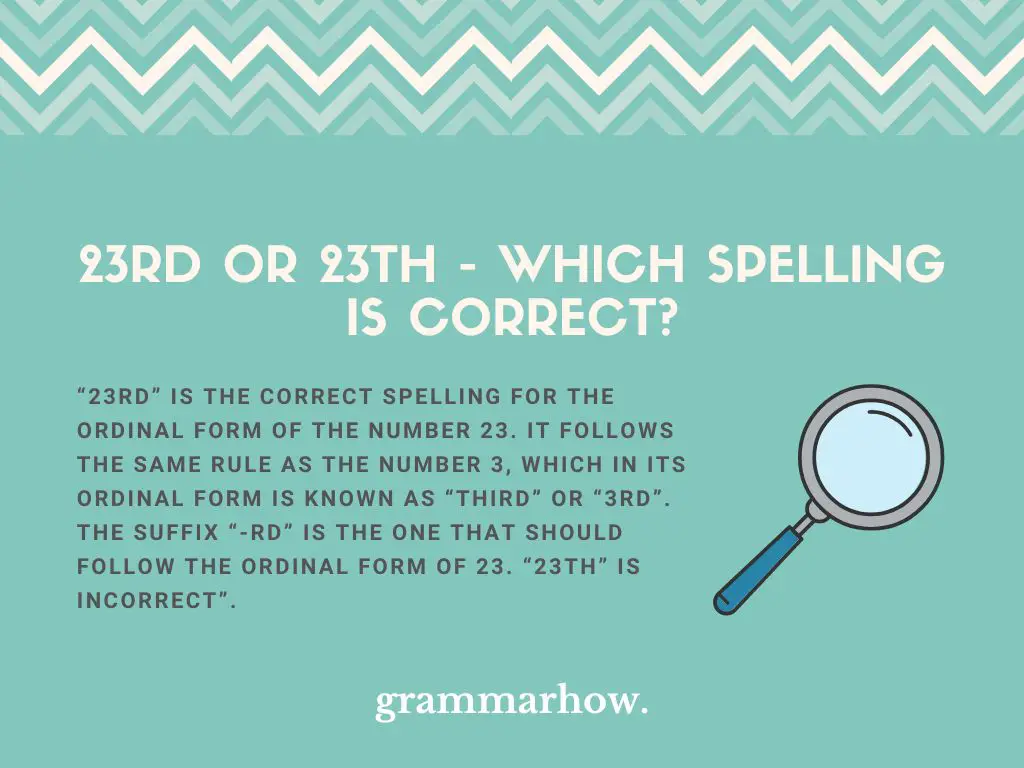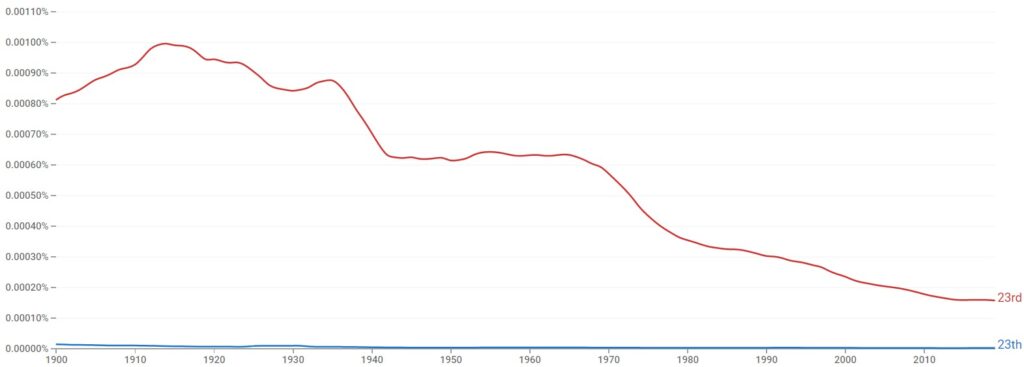What’s the correct spelling for the ordinal form of the number 23? Do you say “23rd” or “23th”?
We want to find out which form is correct and appropriate, and what’s the rule behind it. Let’s find out!
23rd or 23th – Which Spelling Is Correct?
“23rd” is the correct spelling for the ordinal form of the number 23. It follows the same rule as the number 3, which in its ordinal form is known as “Third” or “3rd”. The suffix “-rd” is the one that should follow the ordinal form of 23. “23th” is incorrect”.

Take a look at the examples below:
- Happy 23rd birthday, George!
- Happy 23th birthday, George! (incorrect)
“23rd” and “23th” aren’t synonyms, because only one of the forms is correct and appropriate to be used. Likewise, those forms arent’ interchangeable.
Keep in mind that only “23rd” is appropriate to be used because it follows the rule for numbers ending with 3. You can apply this form to your sentences whenever needed. On the other hand, “23th” is incorrect and should always be avoided.
23rd
“23rd” is the correct form for the ordinal form of the number 23. As the number 23, follows the rue of the number 3 and is also considered to have an irregular ordinal form.
Instead of carrying the usual “-th” suffix, the ordinal form of 3 is known as “Third” (when written as a word) and “3rd” (when shown as a number). The number 23 follows that same rule: when it’s written, it’s “Twenty-Third” and when it’s in a numeral form, it’s “23rd”.
However, “23rd” is a numeral – not a word. Consequently, you won’t find definitions for it in dictionaries like The Cambridge Dictionary and The Merriam-Webster Dictionary.
Take a look at the examples below:
- The birthday party is scheduled for May 23rd.
- On November 23rd, I met her.
- Mark’s birthday is on January 23rd.
- The last day of the semester is March 23rd.
- The party will be on November 23rd.
23th
“23th” is an incorrect spelling for the ordinal form of the number 23. This is a common mistake because most ordinal numbers take on the “-th” suffix and people tend to assume that all numbers follow that rule. The number 23, however, is an irregular ordinal number.
That means that 23 would have a different ordinal form. In fact, 23 follows the same rule as the number 3, which in its ordinal form is “Third” or “3rd” (depending if it’s written or in numeral form). For the number 23, the proper ordinal form is “Twenty-Third”, when written, and “23rd” as a number.
Is “23th” a word? According to The Cambridge Dictionary, “23th” is not a proper form. However, keep in mind that as a numeral it wouldn’t likely pop up in the dictionary anyway. The rule is what you should base your knowledge on.
Let’s take a look at some examples that incorrectly use the form “23th”, followed by a corrected version of the same sentence.
- I can’t believe it’s already September 23th. (incorrect)
- I can’t believe it’s already September 23rd.
- Sarah’s birthday is on April 23th. (incorrect)
- Sarah’s birthday is on April 23rd.
- Are we still having dinner with the Smiths on July 23th? (incorrect)
- Are we still having dinner with the Smiths on July 23rd?
Which Is Used the Most?
Which one of those forms is used more often, “23rd” or “23th”? Take a look at the graph from Google Ngram Viewer below.

According to the graph, “23rd” is the prevalent form, that people choose to use more often in their communications. This is what we expected to see because “23rd” is the correct spelling for the ordinal form of the number 23.
“23th” is an incorrect form that should always be avoided. The graph shows that “23th” is rarely used. You should also avoid using it.
Final Thoughts
“23rd” follows the same rule as the number 3 – which in its ordinal form is “Third” (when written as a word) or “3rd” (when used as a number). “23rd”, with the suffix “-rd” is the correct spelling for the ordinal form of the number 23. “23th” is a misspelling.

Martin holds a Master’s degree in Finance and International Business. He has six years of experience in professional communication with clients, executives, and colleagues. Furthermore, he has teaching experience from Aarhus University. Martin has been featured as an expert in communication and teaching on Forbes and Shopify. Read more about Martin here.
